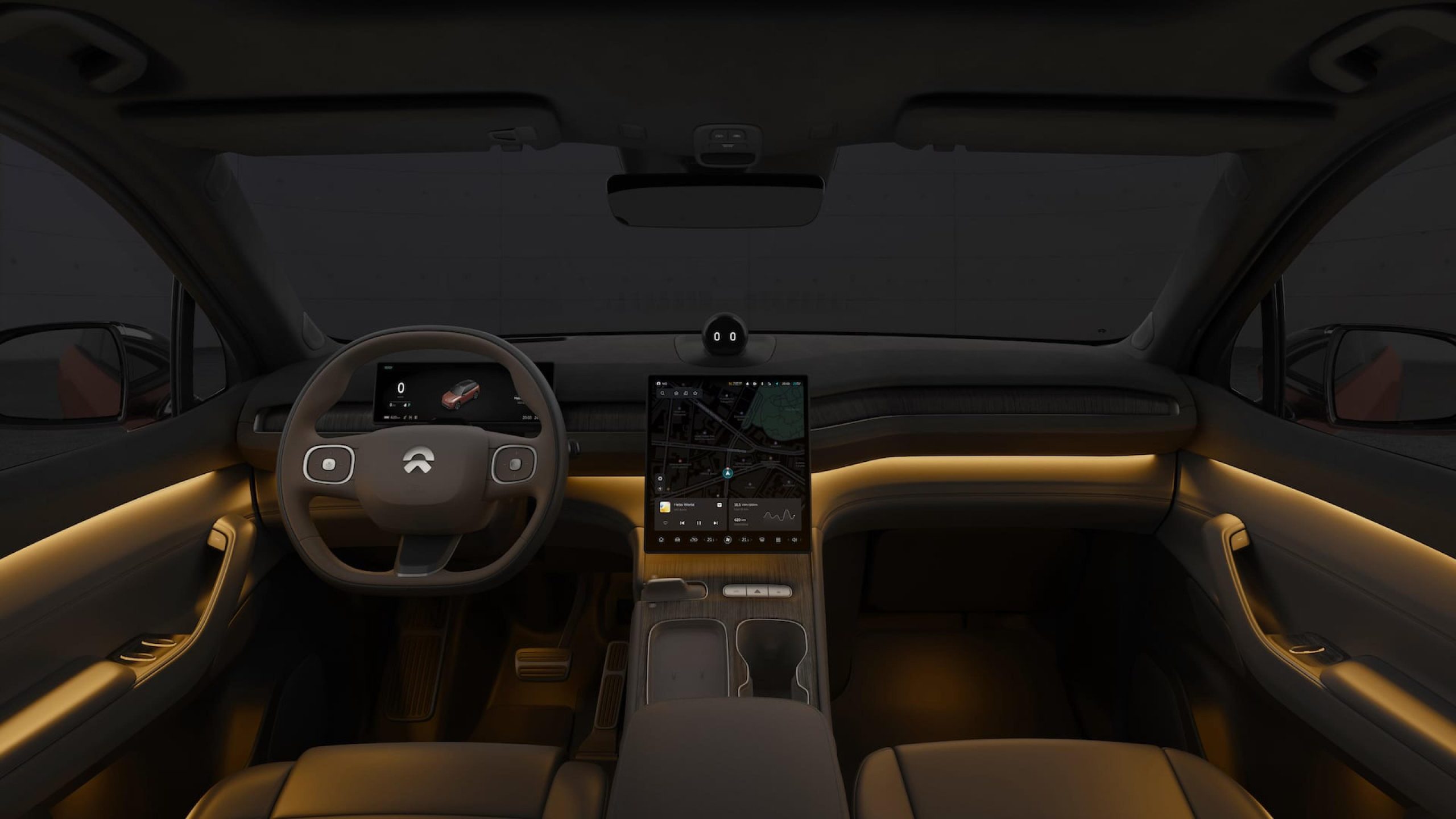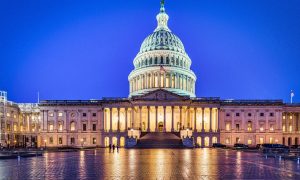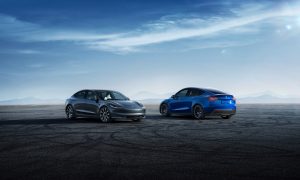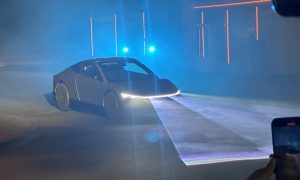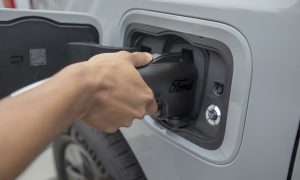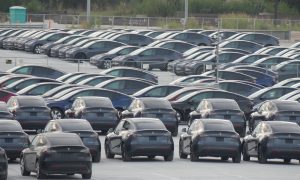The U.S. may place a ban on Chinese software in self-driving and connected vehicles, with the Biden administration expected to propose such rules in the coming weeks.
According to a report from Reuters citing sources briefed on the matter, the U.S. Commerce Department is looking to propose banning Chinese software in autonomous and connected vehicles this month. The rule would ban any Chinese software in U.S. vehicles with Level 3 or higher autonomous capabilities, effectively banning self-driving tests for companies from China.
Level 3 autonomous driving would allow drivers to take their focus off the road and even perform other activities unless otherwise prompted to take over driving by the vehicle. The sources also say the rule would require automakers and suppliers to confirm to regulators that their connected vehicle and Level 3 software platforms weren’t developed in a “foreign entity of concern,” such as China.
On Sunday, a spokesperson from the Commerce Department said the agency was “concerned about the national security risks associated with connected technologies in connected vehicles.”
Chinese self-driving developer reportedly files for IPO in the US
The rule is expected to come from the department’s Bureau of Industry and Security, and the department says that the requirement “will focus on specific systems of concern within the vehicle,” adding that “industry will also have a chance to review that proposed rule and submit comments.”
The Commerce Department initially said last month that it was considering imposing certain limits on some Chinese software, as well as those from other countries considered adversaries.
“Only division of labor and cooperation can bring mutual benefits, and only fair competition can bring technological progress,” said a spokesperson from the Chinese embassy in Washington D.C. in response to the expected proposal “China urges the U.S. to earnestly abide by market principles and international trade rules, and create a level playing field for companies from all countries. China will firmly defend its lawful rights and interests.”
Last Wednesday, the White House and State Department held a meeting with officials from around the world to “jointly address the national security risks associated with connected vehicles,” according to the department. The meeting also included details about the administration’s plans to propose the rule.
The conference included officials from the U.S., Canada, Australia, the European Union (EU), the United Kingdom (UK), Germany, Spain, India, South Korea, and Japan, who “exchanged views on the data and cybersecurity risks associated with connected vehicles and certain components.”
The topic of national security risks surrounding connected vehicles has been around for quite some time, with a group of legislators last November bringing forward concerns that Chinese companies could collect and misuse sensitive data in autonomous vehicle tests.
“The national security risks are quite significant,” said Gina Raimondo, Commerce Secretary, in a statement in May. “We decided to take action because this is really serious stuff.”
The news comes after the U.S. increased tariffs on Chinese electric vehicles (EVs) in May, in order to stave off cheap competitors to U.S.-built products. The EU lodged also launched tariffs on Chinese EVs last month, and Canada is considering similar legislation.
It also comes as multiple companies have gained approval to test autonomous driving tech in China, including domestic makers Nio, BYD, Changan Auto, GAC, SAIC, BAIC BluePark, China FAW Group, SAIC Hongyan, and Yutong Bus. Over the weekend, Mercedes-Benz became the first foreign company to gain approval for Level 4 autonomous driving tests in China, and Tesla is expected to gain full approval for its Full Self-Driving (FSD) Supervised later this year.
Tesla China to test 10 FSD vehicles ahead of expected public rollout: report
What are your thoughts? Let me know at zach@teslarati.com, find me on X at @zacharyvisconti, or send us tips at tips@teslarati.com.
News
Tesla begins Robotaxi certification push in Arizona: report
Tesla seems serious about expanding its Robotaxi service to several states in the coming months.

Tesla has initiated discussions with Arizona transportation regulators to certify its driverless Robotaxi service in the state, as per a recent report from Bloomberg News. The move follows Tesla’s launch of its Robotaxi pilot program in Austin, Texas, as well as CEO Elon Musk’s recent comments about the service’s expansion in the Bay Area.
The Arizona Department of Transportation confirmed to Bloomberg that Tesla has reached out to begin the certification process for autonomous ride-sharing operations in the state. While details remain limited, the outreach suggests that Tesla is serious about expanding its driverless Robotaxi service to several territories in the coming months.
The Arizona development comes as Tesla prepares to expand its service area in Austin this weekend, as per CEO Elon Musk in a post on X. Musk also stated that Tesla is targeting the San Francisco Bay Area as its next major market, with a potential launch “in a month or two,” pending regulatory approvals.
Tesla first launched its autonomous ride-hailing program on June 22 in Austin with a small fleet of Model Y vehicles, accompanied by a Tesla employee in the passenger seat to monitor safety. While still classified as a test, Musk has said the program will expand to about 1,000 vehicles in the coming months. Tesla will later upgrade its Robotaxi fleet with the Cyercab, a two-seater that is designed without a steering wheel.
Sightings of Cybercab castings around the Giga Texas complex suggests that Tesla may be ramping the initial trial production of the self-driving two-seater. Tesla, for its part, has noted in the past that volume production of the Cybercab is expected to start sometime next year.
In California, Tesla has already applied for a transportation charter-party carrier permit from the state’s Public Utilities Commission. The company is reportedly taking a phased approach to operating in California, with the Robotaxi service starting with pre-arranged rides for employees in vehicles with safety drivers.
News
Tesla sets November 6 date for 2025 Annual Shareholder Meeting
The automaker announced the date on Thursday in a Form 8-K.

Tesla has scheduled its 2025 annual shareholder meeting for November 6, addressing investor concerns that the company was nearing a legal deadline to hold the event.
The automaker announced the date on Thursday in a Form 8-K submitted to the United States Securities and Exchange Commission (SEC). The company also listed a new proposal submission deadline of July 31 for items to be included in the proxy statement.
Tesla’s announcement followed calls from a group of 27 shareholders, including the leaders of large public pension funds, which urged Tesla’s board to formally set the meeting date, as noted in a report from The Wall Street Journal.
The group noted that under Texas law, where Tesla is now incorporated, companies must hold annual meetings within 13 months of the last one if requested by shareholders. Tesla’s previous annual shareholder meeting was held on June 13, 2024, which placed the July 13 deadline in focus.
Tesla originally stated in its 2024 annual report that it would file its proxy statement by the end of April. However, an amended filing on April 30 indicated that the Board of Directors had not yet finalized a meeting date, at least at the time.
The April filing also confirmed that Tesla’s board had formed a special committee to evaluate certain matters related to CEO Elon Musk’s compensation plan. Musk’s CEO performance award remains at the center of a lengthy legal dispute in Delaware, Tesla’s former state of incorporation.
Due to the aftermath of Musk’s legal dispute about his compensation plan in Delaware, he has not been paid for his work at Tesla for several years. Musk, for his part, has noted that he is more concerned about his voting stake in Tesla than his actual salary.
At last year’s annual meeting, TSLA shareholders voted to reapprove Elon Musk’s compensation plan and ratified Tesla’s decision to relocate its legal domicile from Delaware to Texas.
Elon Musk
Grok coming to Tesla vehicles next week “at the latest:” Elon Musk
Grok’s rollout to Tesla vehicles is expected to begin next week at the latest.

Elon Musk announced on Thursday that Grok, the large language model developed by his startup xAI, will soon be available in Tesla vehicles. Grok’s rollout to Tesla vehicles is expected to begin next week at the latest, further deepening the ties between the two Elon Musk-led companies.
Tesla–xAI synergy
Musk confirmed the news on X shortly after livestreaming the release of Grok 4, xAI’s latest large language model. “Grok is coming to Tesla vehicles very soon. Next week at the latest,” Musk wrote in a post on social media platform X.
During the livestream, Musk and several members of the xAI team highlighted several upgrades to Grok 4’s voice capabilities and performance metrics, positioning the LLM as competitive with top-tier models from OpenAI and Google.
The in-vehicle integration of Grok marks a new chapter in Tesla’s AI development. While Tesla has long relied on in-house systems for autonomous driving and energy optimization, Grok’s integration would introduce conversational AI directly into its vehicles’ user experience. This integration could potentially improve customer interaction inside Tesla vehicles.
xAI and Tesla’s collaborative footprint
Grok’s upcoming rollout to Tesla vehicles adds to a growing business relationship between Tesla and xAI. Earlier this year, Tesla disclosed that it generated $198.3 million in revenue from commercial, consulting, and support agreements with xAI, as noted in a report from Bloomberg News. A large portion of that amount, however, came from the sale of Megapack energy storage systems to the artificial intelligence startup.
In July 2023, Musk polled X users about whether Tesla should invest $5 billion in xAI. While no formal investment has been made so far, 68% of poll participants voted yes, and Musk has since stated that the idea would be discussed with Tesla’s board.
-

 Elon Musk1 week ago
Elon Musk1 week agoTesla investors will be shocked by Jim Cramer’s latest assessment
-

 Elon Musk3 days ago
Elon Musk3 days agoElon Musk confirms Grok 4 launch on July 9 with livestream event
-

 Elon Musk14 hours ago
Elon Musk14 hours agoxAI launches Grok 4 with new $300/month SuperGrok Heavy subscription
-

 News7 days ago
News7 days agoTesla Model 3 ranks as the safest new car in Europe for 2025, per Euro NCAP tests
-

 Elon Musk2 weeks ago
Elon Musk2 weeks agoA Tesla just delivered itself to a customer autonomously, Elon Musk confirms
-

 Elon Musk1 week ago
Elon Musk1 week agoxAI’s Memphis data center receives air permit despite community criticism
-

 Elon Musk2 weeks ago
Elon Musk2 weeks agoTesla’s Omead Afshar, known as Elon Musk’s right-hand man, leaves company: reports
-

 News2 weeks ago
News2 weeks agoXiaomi CEO congratulates Tesla on first FSD delivery: “We have to continue learning!”

